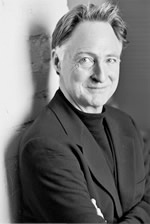About my films
Colin Browne, opening a public discussion with Allan King and Thomas Riedelsheimer during the "ART OF DOCUMENTARY" workshop in Vancouver, Canada in May 2006:
....I´m ashamed to say that I did not know Thomas’ Rivers and Tides prior to seeing his brilliant and moving Touch the Sound at the Vancouver International Film Festival the year before last. Others had seen this wonderful film about artist Andy Goldsworthy who, as the English subtitle reminds us, ‘works with time,’ and so I found a copy and was not disappointed. These two extraordinary films have since become touchstones for me in terms of what’s possible in cinema.
The wonderful Thomas Riedelsheimer also works with time. He’s a filmmaker I want to spend time with, watching his films again and again. I cannot get the image of the drainpipe that becomes a Mandala, from Touch the Sound, out of my mind. Thomas shares with Allan the gift of trusting the image to reveal not only the inner world —the invisible world— but the world we most often forget to see: the extraordinary physical world manifesting itself directly in front of our eyes. He works from the inside out. He takes time and he loves time, which is rare it seems. He is patient, and he is open to what lies all around him.
Thomas has been working on films for twenty years, and most of us will not know as much about his early work as we’d like to. He’s become well known for the two recent documentary portraits—they’re both about time, really—the first about Andy Goldsworthy, who makes art in nature of natural materials, and the second about Evelyn Glennie, the Scottish percussionist. In each case he was director, cinematographer, editor and writer.
Clearly he likes what seem to be paradoxes. There’s a seeming paradox at the heart of both Rivers and Tides and Touch the Sound, and yet after one sees and hears each of these films, the paradox has vaporized. In a sense, what these films reveal is that the paradox is a fiction, a human invention designed—perhaps by the impatient—to buttress the concept of the divided world. Both Rivers and Tides and Touch the Sound remind us that the world—if that’s the right world—is indivisible. What we perceive if we open ourselves to the world in front of us is not division but the play between what William Blake called the Contraries.
‘Without Contraries,’ Blake wrote, ‘there is no progression. Attraction and Repulsion, Reason and Energy, Love and Hate, are necessary to Human existence.’ And then a little later, my favourite: ‘Exuberance is Beauty.’ (The Marriage of Heaven and Hell)
I realize that we may seem to be straying from cinema, but our workshop this weekend, called The Art of the Documentary—Allan and Thomas are among our honoured guests along with Elizabeth Klink, Lara Mazur, Nettie Wilde and Gael MacLean—represents an attempt to rediscover and perhaps recover the poetic charge of documentary. It’s this charge I recognized when I first saw Thomas’ films.
Colin Browne
Writer, film-maker, teacher, critic, and poet Colin Browne is the author of Abraham (Brick Books, 1987) and the critically acclaimed book of poetry Ground Water (Talonbooks, 2002), which was nominated for a Governor General’s Poetry Award and a BC Book Prize in 2003. His documentary films include Father and Son and White Lake, which was nominated for a Canadian Film Award for Best Feature Documentary. He was an editor of Writing magazine and the co-founder of the Kootenay School of Writing. Most recently he completed a documentary portrait of jazz musician Linton Garner, Linton Garner: I Never Said, which was screened at the Vancouver Film Festival and aired on CBC’s “Opening Night” series. He teaches in the School for the Contemporary Arts at Simon Fraser University.

